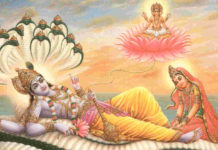Tulsi (Ocynum sanctum)
 Apart from its healthy benefits, it is also a holy plant. The plant is worshipped daily in most of the houses. It is a common custom to place a sprig of tulsi near the head of a dying person.
Apart from its healthy benefits, it is also a holy plant. The plant is worshipped daily in most of the houses. It is a common custom to place a sprig of tulsi near the head of a dying person.
Legend goes that Tulsi was one of Vishnu’s paramours. Out of jealousy, his wife Lakshmi turned her into a plant and the god became the salagram stone to accompany her.
Kusha grass (Poa cynosuroides) and Darbha grass (Agrostis linearis)
 These grasses are used specially in sacred ceremonies. They are specifically mentioned by Lord Krishna in Bhagavad Gita as part of the ideal seat for meditation.
These grasses are used specially in sacred ceremonies. They are specifically mentioned by Lord Krishna in Bhagavad Gita as part of the ideal seat for meditation.
Peepal (Ficus religiosa)
 The tree is considered to be a symbol of Vishnu. The Puranas state that when the demons defeated the gods, Vishnu hid in the peepal tree. The gods prayed the tree for solution. Therefore spontaneous worship to Vishnu can be offered to a peepal tree without having his image.
The tree is considered to be a symbol of Vishnu. The Puranas state that when the demons defeated the gods, Vishnu hid in the peepal tree. The gods prayed the tree for solution. Therefore spontaneous worship to Vishnu can be offered to a peepal tree without having his image.
Banyan (Ficus bengalensis)
 In Hindu mythology, the tree is called Kalpavriksha which fulfils the wishes and other material gains. Lord Vishnu is believed to be the bark, Lord Brahma the roots and Lord Shiva the branches. The tree is associated with Yama, the god of death and is basically planted near crematoria.
In Hindu mythology, the tree is called Kalpavriksha which fulfils the wishes and other material gains. Lord Vishnu is believed to be the bark, Lord Brahma the roots and Lord Shiva the branches. The tree is associated with Yama, the god of death and is basically planted near crematoria.
Bael (Aegle marmelos)
 It is believed that bael Leaves must be included when one is offering prayer to Lord Shiva. The offering of these leaves makes him happy.
It is believed that bael Leaves must be included when one is offering prayer to Lord Shiva. The offering of these leaves makes him happy.
Legend goes that a hunter got tired of hunting and was resting in bael tree. So he picked the bael leaves and started throwing it down. Whenever he threw leaves, he got more power, hope, confident and happiness.
There was a shivalinga just below the tree and the leaves were offered to Lord Shiva. Lord Shiva appeared and granted him different boons.
Asoka (Sereca indica)
 This sacred tree is worshipped in Chaitra, the first month of the Hindu calendar. It is also associated with Kamadeva, the Hindu god of love.
This sacred tree is worshipped in Chaitra, the first month of the Hindu calendar. It is also associated with Kamadeva, the Hindu god of love.



























